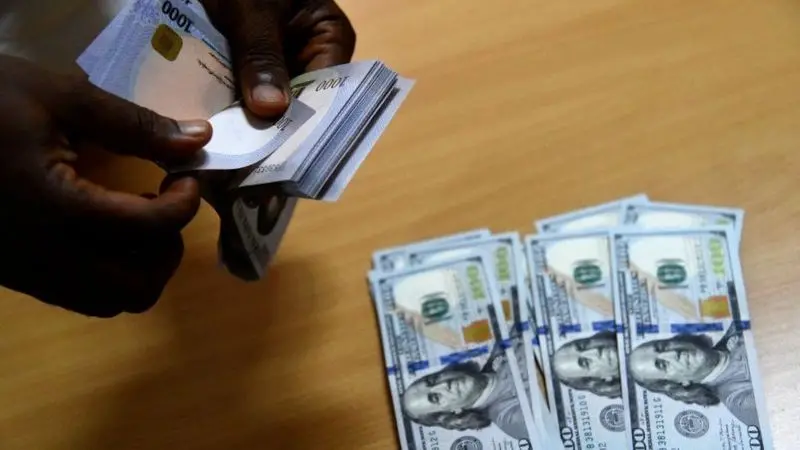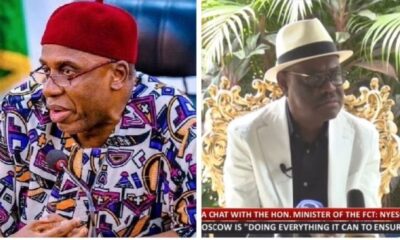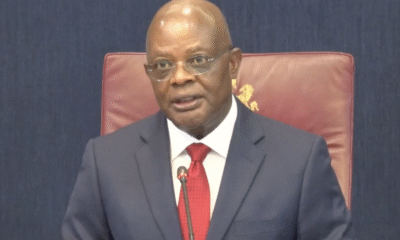ECONOMY
CBN Devalues Naira to ₦3,000/$1 as Black Market Rate Surges to ₦4,200

The Central Bank of Nigeria (CBN) has officially devalued the naira to ₦3,000 per US dollar at the Investors’ and Exporters’ (I&E) window, marking the most significant currency adjustment in Nigeria’s history.
The announcement was made by CBN Governor, Yemi Cardoso, during a press briefing in Abuja. The decision, according to the apex bank, is part of ongoing efforts to align the official exchange rate with prevailing market realities and to address the country’s foreign exchange crisis.
“This adjustment is a painful but necessary step to stabilize our economy and restore investor confidence,” said Yemi Cardoso. “Nigeria can no longer afford to maintain a subsidized exchange rate system that distorts market signals and encourages arbitrage.”
Following the official announcement, the parallel market — often regarded as a more accurate reflection of forex demand — reacted sharply, with the naira depreciating to as low as ₦4,200 per dollar in some parts of the country.
Economic Impact
The devaluation has triggered immediate market responses. Prices of imported goods rose sharply across major cities including Lagos, Abuja, and Port Harcourt. Traders in electronics, pharmaceuticals, and automobile spare parts reported disruptions due to price instability.
Meanwhile, fuel marketers and airline operators are also adjusting prices upwards in anticipation of rising import costs. Travel agencies reported a spike in ticket prices for both domestic and international flights.
The Nigerian Stock Exchange (NGX) recorded a sharp decline in trading, with the All Share Index falling by over 17%, reflecting investor concerns over economic stability.
Public Reaction and Political Response
Public reactions have been swift and largely critical. Social media platforms were flooded with expressions of concern and frustration, as citizens lamented the potential consequences for inflation, purchasing power, and overall cost of living.
Opposition leaders have also weighed in on the development. Former Labour Party presidential candidate, Mr. Peter Obi, described the move as “economically dangerous and socially insensitive,” calling for a comprehensive review of Nigeria’s fiscal and monetary policies.
Civil society organizations have also issued warnings over possible mass protests if the government fails to implement measures to cushion the impact on ordinary Nigerians.
IMF Influence and Future Outlook
Economic analysts suggest the CBN’s decision may be linked to ongoing discussions with the International Monetary Fund (IMF) and other international financial institutions. Currency liberalization is believed to be one of the conditions required to access multibillion-dollar financial support packages.
A senior government official, speaking anonymously, confirmed that Nigeria is currently in talks for a financial bailout to address dwindling foreign reserves and a deepening budget deficit.
Despite the immediate turbulence, the CBN insists that the devaluation will pave the way for a more stable and transparent forex market in the medium to long term.
Discover more from Asiwaju Media
Subscribe to get the latest posts sent to your email.
-

 EDITORIAL5 days ago
EDITORIAL5 days agoHow Chinedu Ogah Perfected the Art of Political Wayo
-

 NEWS7 days ago
NEWS7 days ago2025 C-SAGAS Arts and Sciences Competition Officially Flagged Off in Ebonyi State
-

 ENTERTAINMENT7 days ago
ENTERTAINMENT7 days agoAngela Okorie Appears To Shade Destiny Etiko After Wedding Drama
-

 JOBS/SCHOLARSHIPS5 days ago
JOBS/SCHOLARSHIPS5 days agoCall For Applications: Llama Impact Accelerator Program 2025 for African startups (Equity-free funding of $25,000)
-

 NEWS4 days ago
NEWS4 days agoC-SAGAS Charity Foundation Hosts Key Stakeholders for Strategic Partnerships
-

 POLITICS4 days ago
POLITICS4 days ago‘I Rigged Senatorial Poll Against Emmanuel Onwe’ – Rep Ogah
-

 ENTERTAINMENT6 days ago
ENTERTAINMENT6 days agoLinc Edochie Reportedly Ties the Knot in Private Ceremony with U.S.-Based Partner
-

 ENTERTAINMENT5 days ago
ENTERTAINMENT5 days agoNasboi Survives Car Accident During Nationwide Journey to Secure Davido Feature
-

 NEWS5 days ago
NEWS5 days agoI Made Wike Chief Of Staff So I Could Monitor Him Closely – Rotimi Amaechi
-

 NEWS5 days ago
NEWS5 days agoRivers State Administrator Appoints 11 New Permanent Secretaries
-

 ENTERTAINMENT5 days ago
ENTERTAINMENT5 days agoHe Cheated on Me – Juma Jux’s Ex-Girlfriend Karen Bujulu Speaks Out After His Wedding to Priscilla Ojo
-

 SPORTS3 days ago
SPORTS3 days agoCristian Chivu Appointed Inter Milan Head Coach After Inzaghi’s Exit






















